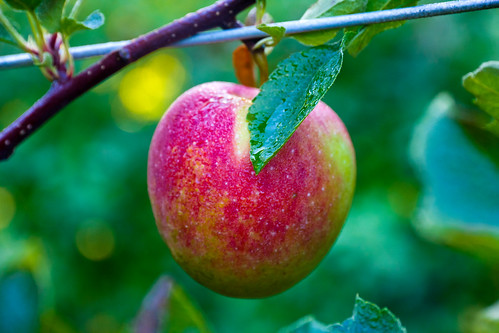
Women who eat dried apple every day for a year see a persistent decrease in their cholesterol levels, according to a new study. In comparison, women who ate prunes daily maintained steady levels over a year, suggesting that the fruit could keep cholesterol numbers from rising. “Both apples and dried plum are pretty powerful in keeping the cholesterol at bay,” said Bahram Arjmandi, the lead author of the study and the chair of the department of Nutrition, Food, and Exercise Sciences at Florida State University. While eating fruit seems beneficial, the study could not say whether women’s cholesterol would have been any different if they hadn’t added the prunes or apples to their diets, because it did not include women who didn’t eat one of the fruits. Arjmandi said there have been earlier studies looking at the health effects of apples, but not a clear experiment in humans on whether eating them can alter risk factors for heart disease. “As much as there is a feeling that an apple a day keeps the doctor away, there has not been much study done,” he said. Arjmandi and his colleagues asked 45 women to eat about 75 grams (roughly two apples’ worth) of dried apple each day for a year. In comparison, 55 women ate 100 grams of dried plum daily for a year. At the beginning of the study and after three, six and 12 months, the women gave a blood sample to measure cholesterol. All of the women had gone through menopause, a factor that is normally tied to a rise in cholesterol levels, Arjmandi said. And average levels started below 200 milligrams per decilitre of blood, the threshold above which guidelines typically say otherwise healthy people are at increased risk of heart attack and stroke. After three months, those who ate prunes saw no difference in their cholesterol levels, and those levels remained steady at the 12 month mark. Among those who ate dried apple, total cholesterol dropped by nine percent and LDL cholesterol (considered the “bad” form of cholesterol) also dropped by 16 per cent. After six months, the apple-eaters saw their total cholesterol drop even further, to 13 per cent less than what it was at the beginning of the study, and LDL cholesterol dropped by 24 per cent. At 12 months out, the cholesterol levels remained lowered. “The extent to which especially apples reduced bad cholesterol, it went beyond my own imagination. So powerful,” Arjmandi told Reuters Health. COMPARING APPLES AND STATINS: Statins can achieve considerable cholesterol reductions too, but as Arjmandi and his colleagues point out in their report in the Journal of the Academy of Nutrition and Dietetics, such drugs cost billions of dollars every year in the US and carry some side effects. Fruit, on the other hand, is part of a healthy diet, and the US Department of Agriculture encourages people to eat fruits and vegetables. It’s unclear how the women’s cholesterol would have changed if they hadn’t eaten the fruit, because “there was no control group,” said Frank Sacks, a professor at the Harvard School of Public Health, by email. In other words, Arjmandi’s team did not compare the fruit-eaters to women who were not asked to add dried fruit to their diet. Additionally, while the group of women who ate apples saw LDL cholesterol reductions over time, those reductions resulted in levels that ended up to be no different than those of the women who ate prunes. Source: Indian Express, Image: flickr.com
